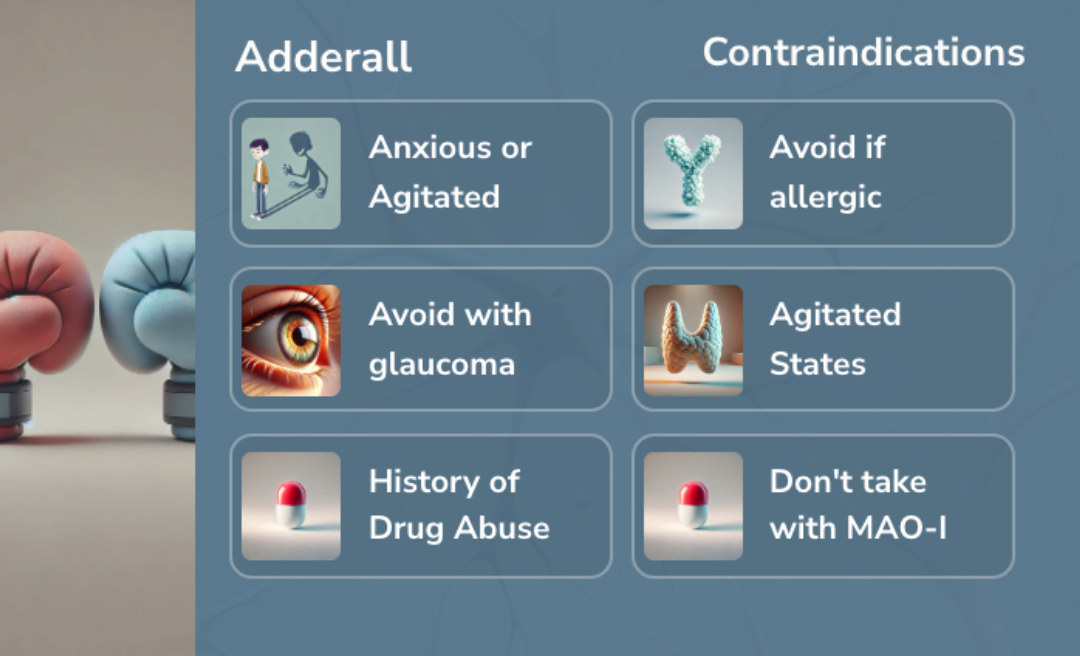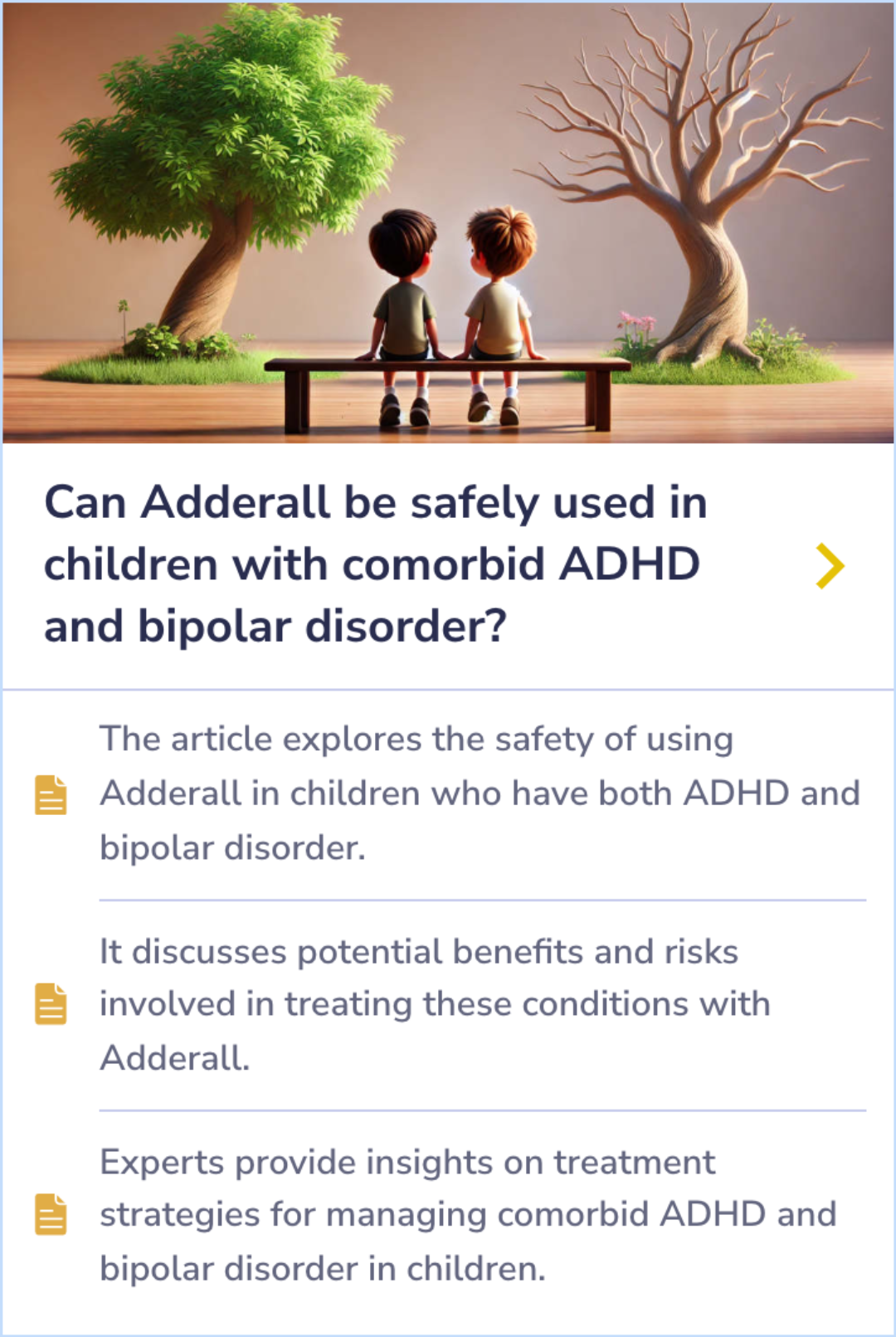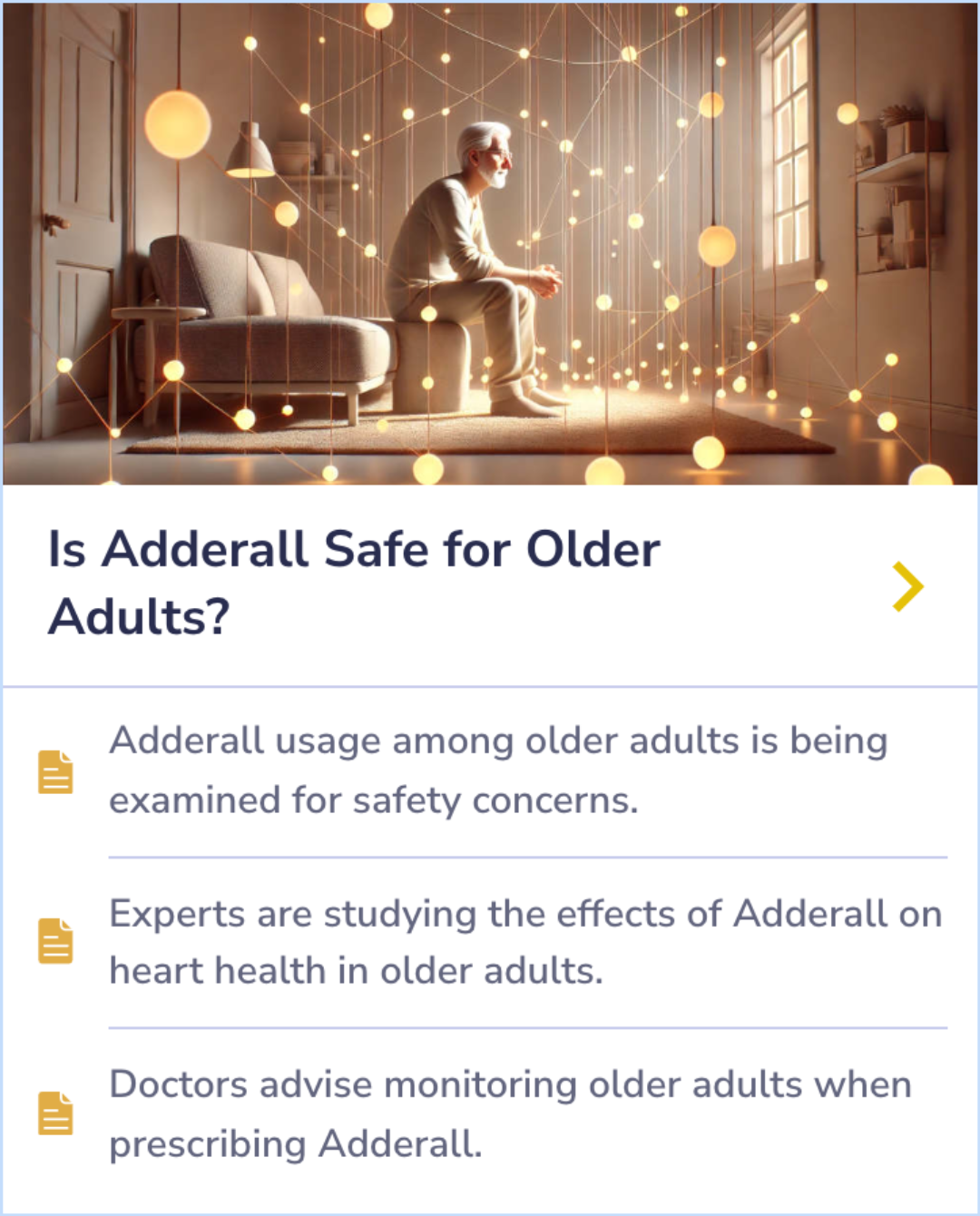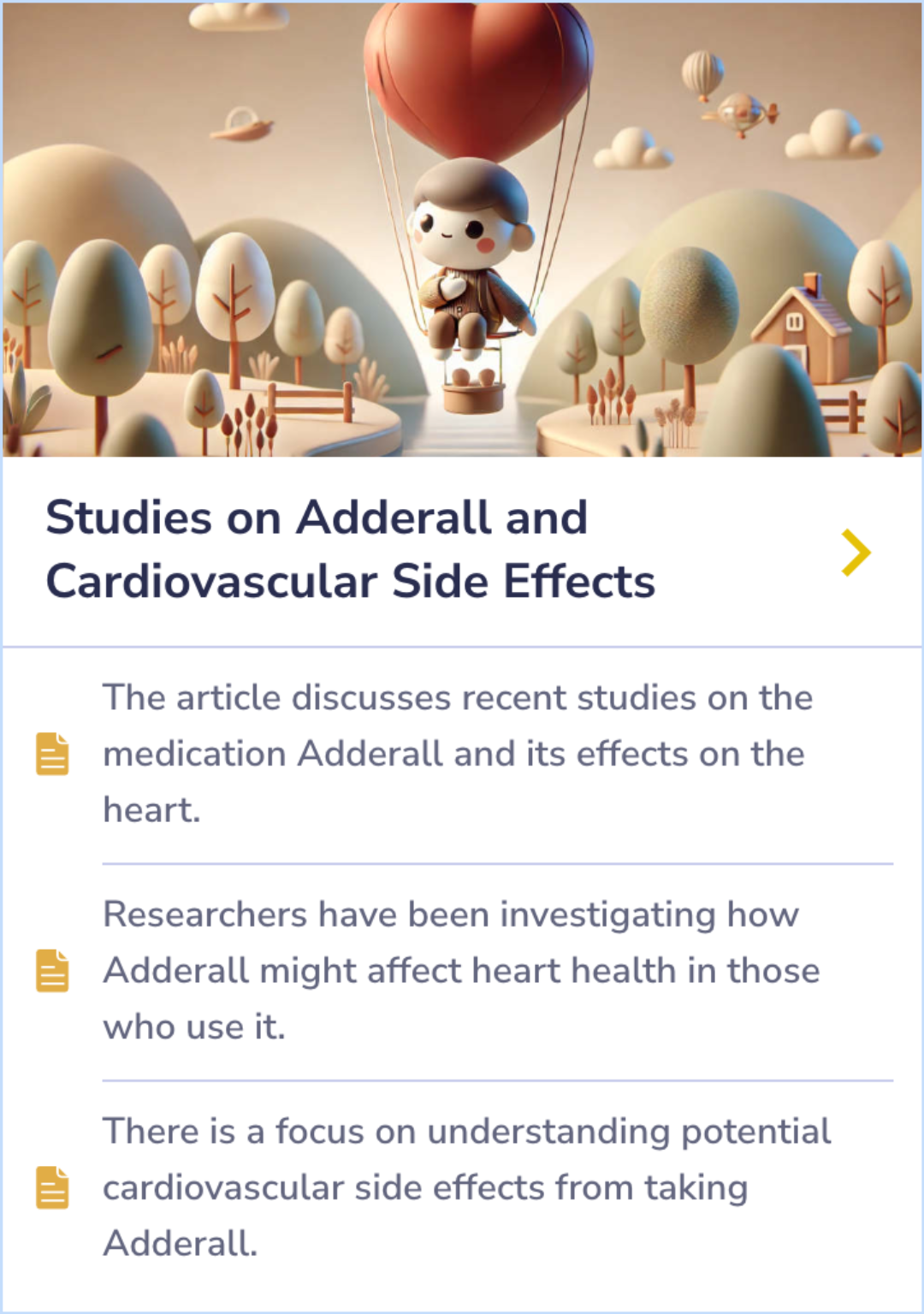Adderall
Evidence Based Answers
Adderall Contraindications
Adderall may increase heart risks for those with cardiovascular conditions and can severely interact with MAO inhibitors. Additionally, it might exacerbate anxiety symptoms and affect emotional brain areas.

Adderall interacts adversely with heart conditions, MAO inhibitors, and anxiety.
Personal Experiences
Perspectives:
Adderall and Cardiovascular Risks
Adderall should be avoided by people with certain heart conditions, including heart disease, severe high blood pressure, and symptomatic cardiovascular disease, as it may increase heart rate and blood pressure.
For patients with these conditions, alternative treatments may need to be considered.
For patients with these conditions, alternative treatments may need to be considered.
“
Source Quotes:
Adderall® should not be taken if you or your child: • have heart disease or hardening of the arteries • have moderate to severe high blood pressure.
Additional contraindications include symptomatic cardiovascular disease, advanced arteriosclerosis, severe hypertension.
Adderall and MAO Inhibitors
Combining Adderall with monoamine oxidase inhibitors (MAOIs) can cause dangerous, potentially fatal reactions, including a sudden rise in blood pressure. This risk remains for two weeks after stopping MAOI therapy.
Patients taking medications like phenelzine or selegiline should inform their healthcare providers to avoid severe health risks.
Patients taking medications like phenelzine or selegiline should inform their healthcare providers to avoid severe health risks.
“
Source Quotes:
Do not administer Adderall® concomitantly or within 14 days after discontinuing MAOI.
Amphetamine is also contraindicated during or within 14 days of MAOI therapy, e.g., phenelzine, due to the risk of hypertensive crisis.
Adderall Use and Anxiety Disorders
Adderall can worsen symptoms of anxiety, such as increased tension and restlessness. It may also affect brain regions linked to fear and emotional responses, potentially heightening anxious feelings.
Careful consideration is needed before prescribing Adderall to patients with significant anxiety.
Careful consideration is needed before prescribing Adderall to patients with significant anxiety.
“
Source Quotes:
Tell your doctor if you have feelings of anxiety, tension, or agitation. Your doctor will probably tell you not to take dextroamphetamine and amphetamine.
In healthy human volunteers, AMP has been reported to potentiate amygdalar activity in response to the processing of angry and fearful facial expressions.
Adderall and Glaucoma
People with glaucoma should avoid Adderall, as it can worsen eye pressure and increase the risk of vision problems.
Screening for glaucoma before prescribing stimulants is recommended to ensure safety.
Screening for glaucoma before prescribing stimulants is recommended to ensure safety.
“
Source Quotes:
Adderall® should not be taken if you or your child have an eye problem called glaucoma.
Tell your doctor if you have glaucoma (increased pressure in the eye that may cause vision loss).
Key Takeaways
Conclusions
Adderall use poses significant risks in individuals with certain heart conditions, as it can elevate heart rate and blood pressure. Alternatives should be considered for those with severe cardiovascular issues.
The combination of Adderall with MAO inhibitors can lead to dangerous spikes in blood pressure, necessitating caution for patients transitioning off such medications. Furthermore, Adderall may exacerbate anxiety, heightening tension and restlessness, so careful evaluation is required in patients with anxiety disorders.
Individuals with glaucoma should steer clear of Adderall due to the potential for increased eye pressure and vision issues, making pre-screening for glaucoma a prudent step.
The combination of Adderall with MAO inhibitors can lead to dangerous spikes in blood pressure, necessitating caution for patients transitioning off such medications. Furthermore, Adderall may exacerbate anxiety, heightening tension and restlessness, so careful evaluation is required in patients with anxiety disorders.
Individuals with glaucoma should steer clear of Adderall due to the potential for increased eye pressure and vision issues, making pre-screening for glaucoma a prudent step.

Evidence Summary
Adderall Use in Children with ADHD and Bipolar Disorder
Children diagnosed with both ADHD and bipolar disorder present complex treatment challenges. Using Adderall to manage symptoms can offer some potential benefits, but balancing safety is key. The risks involve interactions with mood instability and other bipolar symptoms.
Experts weigh in on how to approach these cases, offering insights into strategies that may stabilize mood while managing ADHD symptoms.
The unique nature of comorbid ADHD and bipolar disorder requires thoughtful consideration when prescribing stimulants like Adderall.
Experts weigh in on how to approach these cases, offering insights into strategies that may stabilize mood while managing ADHD symptoms.
The unique nature of comorbid ADHD and bipolar disorder requires thoughtful consideration when prescribing stimulants like Adderall.
Evidence Summary
Adderall's Heart Safety for Older Adults
Researchers are closely examining Adderall's impact on heart health for older adults. There is growing attention on how this medication could affect cardiovascular risk, with doctors emphasizing careful monitoring during treatment.
Experts are evaluating safety concerns around Adderall use in older adults, particularly its potential influence on heart health and the need for tailored prescribing practices.
Experts are evaluating safety concerns around Adderall use in older adults, particularly its potential influence on heart health and the need for tailored prescribing practices.
Evidence Summary
How Adderall May Impact Heart Health
Research on Adderall raises concerns about how the medication may influence heart health, specifically the potential for cardiovascular side effects. Researchers are looking closely at how these effects might present in individuals who regularly take Adderall.
Several studies investigate whether using Adderall could impact aspects of heart function, with attention to those who might experience increased risks.
The focus is on possible side effects like irregular heart rhythms and other cardiovascular responses in those on this medication.
Several studies investigate whether using Adderall could impact aspects of heart function, with attention to those who might experience increased risks.
The focus is on possible side effects like irregular heart rhythms and other cardiovascular responses in those on this medication.


